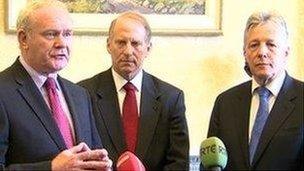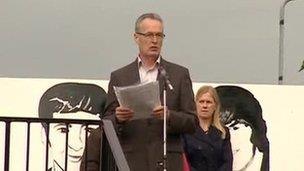MLAs return to Stormont and fall-out from a difficult summer
- Published

US former envoy Richard Hass, centre, with Peter Robinson and Martin McGuinness
Parades and flags, new councils and welfare changes.
As MLAs return to their debating chamber at Stormont, the first proper week back to work looks set to be dominated by recriminations over the difficult summer.
The DUP has proposed a motion critical of Gerry Kelly's behaviour at a republican commemoration at Castlederg, County Tyrone.
Sinn Féin has responded with its own motion expressing concern about the summer violence and calling on all politicians to promote tolerance and reconciliation.
Will the MLAs engage in more bitter exchanges or follow the example of their counterparts at Belfast City Council in trying to agree a compromise approach?
Either way, it is unlikely any real progress will be made on the divisive issues of parades, flags and the past within the assembly chamber.
Instead, that will be the task of the negotiators convening in mid-September under the chairmanship of former US envoy Richard Haass.
As the politicians lock horns, officials in the first and deputy first ministers' office and the employment and learning department will be tackling community relations at a different level.
They will be designing the cross-community youth employment and training schemes outlined in Stormont's Together Building a United Community document.

The DUP has proposed a motion critical of Gerry Kelly's behaviour at Castlederg
Conall McDevitt's decision to leave politics leaves an unquestionable void on the SDLP benches.
But expect a focus on the SDLP's other Young Turk, Mark H Durkan. The new environment minister has to decide whether to continue steering the Planning Bill through its remaining stages. His predecessor, Alex Attwood, hinted that the bill could be withdrawn as a "nuclear option" in response to the DUP and Sinn Féin's move grafting on new special economic zones to the legislation.
Another task for the environment minister will be pushing through a law that will set out how the 11 new councils will function. The timetable is tight, as elections to shadow councils are due in the summer of 2014.
How the new councils take decisions could prove sensitive. Will everyone agree with the proposed guarantees for minorities? The Belfast union flag dispute has already demonstrated that council voting can be highly contentious. One source suggests the question of which flags fly over new council headquarters will not be dealt with in the main local government bill, but in separate regulations.
Justice Minister David Ford will be busy trying to limit the cost of legal aid as part of his push towards "faster, fairer" justice. He has also commissioned research on prostitution.
He says this is an attempt to inform the debate around Lord Morrow's bill on human trafficking which would make it illegal for anyone to pay for sex. Cynics might regard it as an attempt to slow progress on the Private Members' bill.
Enterprise Minister Arlene Foster will be hosting an investment conference in the second week of October - the event is a follow up to the Fermanagh G8 summit.
Ms Foster's DUP colleague, Nelson McCausland, could find himself spending many hours in the assembly chamber as he tries to take the welfare reform legislation through its final stages.

Conall McDevitt's decision 'leaves a void'
Over the summer, Sinn Féin hinted that a deal had been agreed to ameliorate the impact of the so called "bedroom tax". But that was before the DUP/Sinn Féin fell out over parades and peace centres. Given the poor publicity surrounding the pilot programmes for welfare reform in England and the scepticism of both the SDLP and the UUP, nothing on welfare reform can be taken for granted.
Away from the chamber, Mr McCausland may well face more questions about his dealings with the Housing Executive. Senior civil servants are conducting a fact finding investigation into how the social development minister's special adviser handled issues related to the maintenance firm Red Sky.
As ever in politics, the most interesting stories will be the least predictable. Stormont ministers may discover this in a particularly direct manner, as the assembly's rather staid question time format is being revamped with the introduction of Topical Questions.
Previously all questions had to be tabled well in advance of an assembly session meaning that exchanges often involved issues already well aired by the media. Now the first 15 minutes will, like Prime Minister's Questions in the Commons, be far more up to the minute. Ministers will know which MLA might cross question them, but not which subject they might raise.
The new format mean ministers and backbenchers will have to be quicker on their feet. Hopefully it should make Assembly Question Times a more vibrant affair and a better watch for the dedicated viewers and listeners of BBC Northern Ireland's Stormont Today and Today At The Assembly.